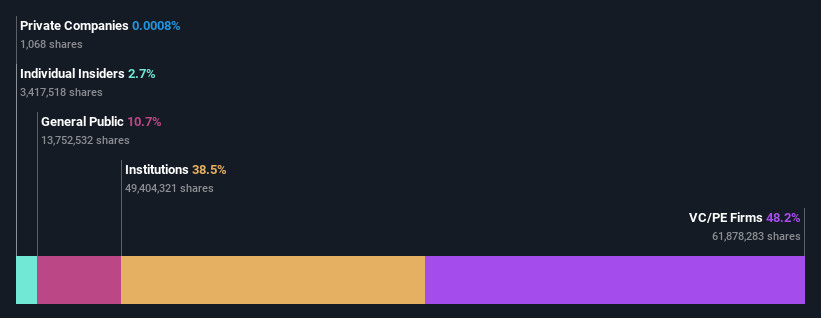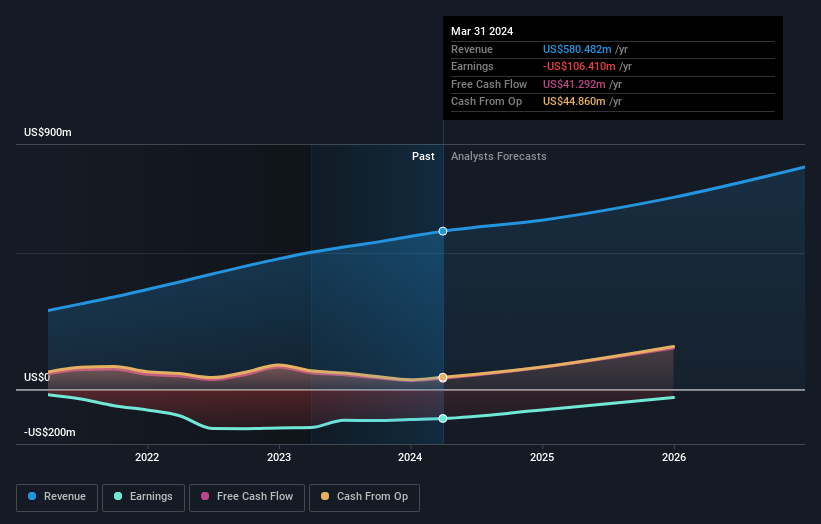Please use a PC Browser to access Register-Tadawul
Jamf Holding Corp.'s (NASDAQ:JAMF) market cap dropped US$82m last week; individual investors who hold 48% were hit as were institutions
Jamf Holding JAMF | 11.50 | -0.69% |
Key Insights
- The considerable ownership by private equity firms in Jamf Holding indicates that they collectively have a greater say in management and business strategy
- 55% of the business is held by the top 3 shareholders
To get a sense of who is truly in control of Jamf Holding Corp. (NASDAQ:JAMF), it is important to understand the ownership structure of the business. And the group that holds the biggest piece of the pie are private equity firms with 48% ownership. In other words, the group stands to gain the most (or lose the most) from their investment into the company.
While the holdings of private equity firms took a hit after last week’s 4.0% price drop, institutions with their 38% holdings also suffered.
Let's delve deeper into each type of owner of Jamf Holding, beginning with the chart below.

What Does The Institutional Ownership Tell Us About Jamf Holding?
Institutions typically measure themselves against a benchmark when reporting to their own investors, so they often become more enthusiastic about a stock once it's included in a major index. We would expect most companies to have some institutions on the register, especially if they are growing.
We can see that Jamf Holding does have institutional investors; and they hold a good portion of the company's stock. This suggests some credibility amongst professional investors. But we can't rely on that fact alone since institutions make bad investments sometimes, just like everyone does. When multiple institutions own a stock, there's always a risk that they are in a 'crowded trade'. When such a trade goes wrong, multiple parties may compete to sell stock fast. This risk is higher in a company without a history of growth. You can see Jamf Holding's historic earnings and revenue below, but keep in mind there's always more to the story.

We note that hedge funds don't have a meaningful investment in Jamf Holding. Our data shows that Vista Equity Partners Management, LLC is the largest shareholder with 35% of shares outstanding. With 13% and 6.6% of the shares outstanding respectively, Dragoneer Investment Group, LLC and Wellington Management Group LLP are the second and third largest shareholders. Furthermore, CEO John Strosahl is the owner of 0.8% of the company's shares.
After doing some more digging, we found that the top 3 shareholders collectively control more than half of the company's shares, implying that they have considerable power to influence the company's decisions.
While it makes sense to study institutional ownership data for a company, it also makes sense to study analyst sentiments to know which way the wind is blowing. There are plenty of analysts covering the stock, so it might be worth seeing what they are forecasting, too.
Insider Ownership Of Jamf Holding
The definition of an insider can differ slightly between different countries, but members of the board of directors always count. Company management run the business, but the CEO will answer to the board, even if he or she is a member of it.
Most consider insider ownership a positive because it can indicate the board is well aligned with other shareholders. However, on some occasions too much power is concentrated within this group.
Our most recent data indicates that insiders own some shares in Jamf Holding Corp.. This is a big company, so it is good to see this level of alignment. Insiders own US$52m worth of shares (at current prices). Most would say this shows alignment of interests between shareholders and the board. Still, it might be worth checking if those insiders have been selling.
General Public Ownership
With a 11% ownership, the general public, mostly comprising of individual investors, have some degree of sway over Jamf Holding. This size of ownership, while considerable, may not be enough to change company policy if the decision is not in sync with other large shareholders.
Private Equity Ownership
With an ownership of 48%, private equity firms are in a position to play a role in shaping corporate strategy with a focus on value creation. Sometimes we see private equity stick around for the long term, but generally speaking they have a shorter investment horizon and -- as the name suggests -- don't invest in public companies much. After some time they may look to sell and redeploy capital elsewhere.
Next Steps:
It's always worth thinking about the different groups who own shares in a company. But to understand Jamf Holding better, we need to consider many other factors.
If you are like me, you may want to think about whether this company will grow or shrink. Luckily, you can check this free report showing analyst forecasts for its future.
NB: Figures in this article are calculated using data from the last twelve months, which refer to the 12-month period ending on the last date of the month the financial statement is dated. This may not be consistent with full year annual report figures.
This article by Simply Wall St is general in nature. We provide commentary based on historical data and analyst forecasts only using an unbiased methodology and our articles are not intended to be financial advice. It does not constitute a recommendation to buy or sell any stock, and does not take account of your objectives, or your financial situation. We aim to bring you long-term focused analysis driven by fundamental data. Note that our analysis may not factor in the latest price-sensitive company announcements or qualitative material. Simply Wall St has no position in any stocks mentioned.



